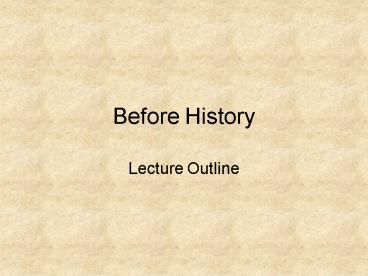Before History - PowerPoint PPT Presentation
1 / 17
Title: Before History
1
Before History
- Lecture Outline
2
Review Questions
- What is History?
- What is its method?
- What is its purpose?
3
Before HistoryNotions about the Past in the
Ancient Near East
4
The Egyptians
- c. 3200 B.C. recorded deeds of kings as relief
sculptures - c. 2600 B.C. Kings Cheops and Chephren kept
libraries - c. 2500-2300 B.C. annals and king lists going
back to the 4th millennium - songs describing military victories
- Some descriptions of events
- Autobiography (in form of obituary)
- Travel literature
5
Egyptian writing about the past
- Not history in modern sense
- No word in Egyptian langue for history
- Past and future seen static and as being
controlled by the gods - Everything depended on the pharaoh, gods
representative on earth - Notion of divine controlling human existence
- No conception of cause and effect
6
http//www.virtual-egyptian-museum.org/Collection/
FullVisit/Collection.FullVisit-JFR.html?../Content
/STO.XL.00527.html0
7
Sumerians and Babylonians
- Belief that human existence was controlled by
gods - Notion of past as providing clues for the future
ancient Sumerians looked for signs from the gods
in the past in order to learn from them and avoid
mistakes and disasters such as floods in the
future. - From 3rd millennium onwards large number of
records of political, military, economic events
kept. - View of their civilization as static the gods
planned it to always be like it is.
8
Nature of narratives
- Ca. 2000 B.C. at Lagash palace and temple
archivists collected variety of narratives of
events. - Narratives of events have divinities in leading
roles - But contain some historical background
9
The Epic of Gilgamesh
- Oldest version believed to be from 3rd millennium
- Contains oldest version of flood story
- Also variety of topics
- Oldest heroic epic story of Gilgameshs journey
to wisdom. From denial of death, search for
immortality to acceptance of human condition
debate on nature and nurture benefits of
civilization over nature and its cost. - Particularly relevant to Babylonian and Assyrian
audience debate on what constituted a good and a
bad king. - Historical element King by name of Gilgamesh
listed on Babylonian king list
10
The Hittites
- c. 1700 B.C. (modern Turkey)
- Their writings closer to our idea ofhistorical
writing - In Hittite capital library of 15,000 tables and
fragments found - Reflects advances on historical ideas of
Mesopotamia and Egypt - After 1400 B.C. political treatises include
reports on previous events with attention to
cause and effect - Empire broke up after 12th century B.C.
11
http//encarta.msn.com/media_461516791_761563583_-
1_1/Hittite_Empire.html
12
The Phoenicians
- After fall of Hittite Empire new small states
formed bordering Asia Minor, Mesopotamia and
Syria all areas influencing way of life and
culture of Phoenicians. - Made largest use of writing
- Recording ordinary affairs of life and public
events - Brought writing to Greek World
13
- Traditions of Ancient Near East transmitted to
Greek World - By Phoenicians
- By Persians
- By cultural influences of other neighbouring
states in Asia Minor - As seafaring people, Greeks always in contact
with other cultures throughout Mediterranean
World
14
The Greeks and the Birth of History
- Homer 8th century Iliad, Odyssey
- Hesiod ca. 700 B.C.
- Ionian Philosophers - Pre-Socratics
- Ionian Intellectual Revolution 7th and 6th
centuries
15
Ionian Thinkers also called Pre-Socratics
- Philosophers before Socrates
- Work only survives in fragments quoted by others
- Sought natural explanations for natural phenomena
- Explored 1. The origins of the universe, 2. The
composition of the universe, 3. The plurality of
phenomena
16
Pre-Socratic Schools
- The Milesians Thales (624-546 BCE), Anaximander
(610-546 BCE), Anaximines (585-525 BCE) - The Pythagoreans Pythagoras (582-496 BCE)
- The Eleatics Xenophanes (570-470 BCE),
Parmenides (510-440 BCE), Zeno (490-430 BCE) - The Pluralists Empedocles (490-430 BCE),
Anaxagoras (500-428 BCE) - Heraclitus (535-475 BCE)
17
The Greek Historians
- Hecataeus of Miletus ca. 500 B.C.
- Journey round the World
- Genealogies
- Herodotus of Halicarnassus c 490/480-429/5 B.C.
The Histories - Thucydides c. 460/55-399/8

